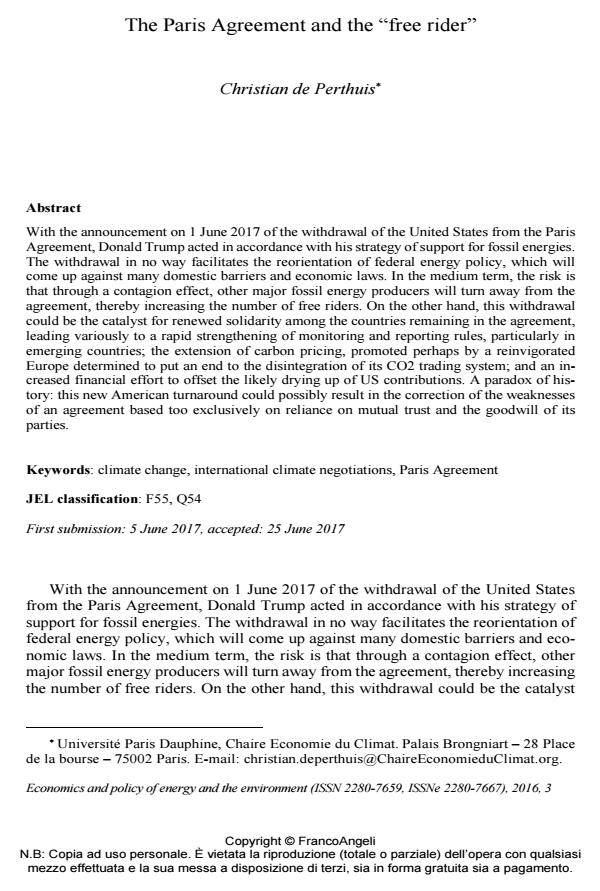The Paris Agreement and the "free rider"
Titolo Rivista ECONOMICS AND POLICY OF ENERGY AND THE ENVIRONMENT
Autori/Curatori Christian de Perthuis
Anno di pubblicazione 2017 Fascicolo 2016/3 Lingua Inglese
Numero pagine 14 P. 31-44 Dimensione file 174 KB
DOI 10.3280/EFE2016-003003
Il DOI è il codice a barre della proprietà intellettuale: per saperne di più
clicca qui
Qui sotto puoi vedere in anteprima la prima pagina di questo articolo.
Se questo articolo ti interessa, lo puoi acquistare (e scaricare in formato pdf) seguendo le facili indicazioni per acquistare il download credit. Acquista Download Credits per scaricare questo Articolo in formato PDF

FrancoAngeli è membro della Publishers International Linking Association, Inc (PILA)associazione indipendente e non profit per facilitare (attraverso i servizi tecnologici implementati da CrossRef.org) l’accesso degli studiosi ai contenuti digitali nelle pubblicazioni professionali e scientifiche
With the announcement on 1 June 2017 of the withdrawal of the United States from the Paris Agreement, Donald Trump acted in accordance with his strategy of support for fossil energies. The withdrawal in no way facilitates the reorientation of federal energy policy, which will come up against many domestic barriers and economic laws. In the medium term, the risk is that through a contagion effect, other major fossil energy producers will turn away from the agreement, thereby increasing the number of free riders. On the other hand, this withdrawal could be the catalyst for renewed solidarity among the countries remaining in the agreement, leading variously to a rapid strengthening of monitoring and reporting rules, particularly in emerging countries; the extension of carbon pricing, promoted perhaps by a reinvigorated Europe determined to put an end to the disintegration of its CO2 trading system; and an increased financial effort to offset the likely drying up of US contributions. A paradox of history: this new American turnaround could possibly result in the correction of the weaknesses of an agreement based too exclusively on reliance on mutual trust and the goodwill of its parties.
Keywords:Climate change, international climate negotiations, Paris Agreement
Jel codes:F55, Q54
- Aldy J.E. and Stavins R.N. (2010). Post-Kyoto International Climate Policy: Implementing Architectures for Agreement. Cambridge: Cambridge University Press.
- Aykut S. and Dayan A. (2014). Gouverner le climat? Vingt ans de négociations Internationales. Paris: Presses Universitaires de Science Po.
- de Perthuis Ch. and Trotignon R. (2014). Governance of CO2 markets: Lessons from the EU ETS. Energy Policy, 75: 100-106.
- de Perthuis Ch. and Trotignon R. (2015). Le climat à quel prix? La négociation climatique. Paris: Odile Jacob.
- DeMarco L. and McGillivray J. (2017). The Elephant in the Room. IETA Greenhouse Gas Market Report.
- Gollier Ch. and Tirole J. (2015). Negotiating effective institutions against climate change. Economics of Energy and Environmental Policy, 4(2).
- Guesnerie R. (2003). Kyoto et l’économie de l’effet de serre. Paris: Documentation Française.
- Ki-Moon B. and Stavins R. (2017). Why the US Should Remain in the Paris Climate Agreement. Harvard Kennedy School, Viewpoints, April.
- Maljean-Dubois S. and Waëmer M. (2016). La diplomatie climatique de Rio 1992 à Paris 2015. Paris: Editions Pédone.
- Nordhaus W.D. (2013). The Climate Casino, Risk, Uncertainty and Economics for a Warming World. New Haven, CT: Yale University Press.
- Olsom M. (1965). The Logic of Collective Action. Cambridge, MA-London: Harvard University Press.
- Soomro S. (2016). ICAO’s global offset mechanism draws worldwide attention to international aviation emissions. Policy Brief, Climate Economics Chair, October.
- Tirole J. (2009). Politique climatique, une nouvelle architecture. Paris: Documentation Française.
- Weitzman M.L. (2015). Internalizing the Climate Externality: Can a Uniform Price Commitment Help? Economics of Energy and Environmental Policy, 4(2).
- Wiener J. (2017). Climate Policy in the New US Administration. Climate Economics Chaier, Policy Brief, June.
Christian de Perthuis, The Paris Agreement and the "free rider" in "ECONOMICS AND POLICY OF ENERGY AND THE ENVIRONMENT" 3/2016, pp 31-44, DOI: 10.3280/EFE2016-003003